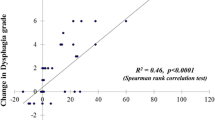Abstract
Functional dysphagia therapy (FDT) is a noninvasive procedure that can accompany percutaneous endoscopic gastrostomy (PEG) treatment and supports transitioning from tube to oral feeding. In this retrospective study, we investigated the outcome of FDT with or without PEG feeding. Patients with dysphagia were divided into two groups: those with PEG feeding (N = 117) and those with exclusively oral feeding (N = 105). Both groups received functional training (oral motor skills/sensation, compensatory swallowing techniques) from speech-language therapists. Functional oral intake, weight, Barthel index, and speech and language abilities were evaluated pre- and post-training. The non-PEG group showed a significant post-treatment improvement in functional oral intake, with diet improvement from pasty consistency to firm meals in most cases. However, even severely disordered patients (with PEG feeding) showed a significant increase in functional oral intake, still requiring PEG feeding post-treatment but able to take some food orally. The sooner a PEG was placed, the more functional oral intake improved. Significantly more complications and higher mortality occurred in the PEG group compared to the group with exclusively oral feeding. Dysphagia treatment in the elderly requires a multiprofessional setting, differentiated assessment, and functional training of oral motor skills and sensation and swallowing techniques.
Similar content being viewed by others
References
Gordon C, Hewer RL, Wade D. Dysphagia in acute stroke. Br Med J (Clin Res Ed). 1987;295:411–5.
Bath PMW, Bath FJ, Smithard DG. Interventions for dysphagia in acute stroke. Cochrane Database Syst Rev 2000;(2):CD000323.
Kolb G. Dysphagie und Mangelernährung im Alter. Eur J Geriatr. 2001;3:66–71.
Prosiegel M. Neurogene Dysphagien im höheren Lebensalter. NeuroGeriatrie. 2005;2:135–42.
Schröter-Morasch H. Medizinische Basisversorgung von Patienten mit Schluckstörungen. Trachealkanülen - Sondenernährung. In: Bartolome G, et al., editors. Schluckstörungen: Diagnostik und Rehabilitation. 2nd ed. Stuttgart: Urban & Fischer; 1999. p. 156–78.
Wirth R, Volkert D, Bauer JM, Schulz RJ, Borchelt M, Fleischhauer C, et al. PEG tube placement in German geriatric wards—a retrospective data-base analysis. Z Gerontol Geriatr. 2007;40:21–30.
Dennis MS, Lewis SC, Warlow C. Effect of timing and method of enteral tube feeding for dysphagic stroke patients (FOOD): a multicentre randomised controlled trial. Lancet. 2005;365:764–72.
Dennis MS, Lewis SC, Cranswick G, Forbes J; FOOD Trial Collaboration. FOOD: a multicentre randomised trial evaluating feeding policies in patients admitted to hospital with a recent stroke. Health Technol Assess 2006;10(2):iii–iv, ix–x, 1–120.
Bath PM, Bath-Hextall FJ, Smithard DG. Interventions for dysphagia in acute stroke. Cochrane Database Syst Rev 2000;(2):CD000323 [review].
Park RH, Allison MC, Lang J, Spence E, Morris AJ, Danesh BJ, et al. Randomized comparison of percutaneous endoscopic gastrostomy and nasogastric tube feeding with persisting neurological dysphagia. BMJ. 1992;304:1406–9.
Norton B, Homer-Ward M, Donnelly MT, Long RG, Holmes GKT. A randomised prospective comparison of percutaneous endoscopic gastrostomy and nasogastric tube feeding after acute dysphagic stroke. BMJ. 1996;312:13–6.
Ha L, Hauge T. Percutaneous endoscopic gastrostomy (PEG) for enteral nutrition in patients with stroke. Scand J Gastroenterol. 2003;9:962–6.
Bartolome G. Grundlagen der funktionellen Dysphagietherapie (FDT). In: Bartolome G, et al., editors. Schluckstörungen: Diagnostik und Rehabilitation. 2nd ed. Stuttgart: Urban & Fischer; 1999. p. 179–296.
Logemann JA. Behavioral management for oropharyngeal dysphagia. Folia Phoniatr Logop. 1999;51:199–212.
Kays S, Robbins J. Effects of sensorimotor exercise on swallowing outcomes relative to age and age-related disease. Semin Speech Lang. 2006;27:245–59.
Burkhead LM, Sapienza CM, Rosenbek JC. Strength-training exercise in dysphagia rehabilitation: principles, procedures, and directions for future research. Dysphagia. 2007;22:251–65.
Robbins J, Butler SG, Daniels SK, Diez Gross R, Langmore S, Lazarus CL, et al. Swallowing and dysphagia rehabilitation: translating principles of neural plasticity into clinically oriented evidence. J Speech Lang Hear Res. 2008;51:276–300.
Logemann JA. Treatment of oral and pharyngeal dysphagia. Phys Med Rehabil Clin N Am. 2008;19:803–16.
Langmore SE, Terpenning MS, Schork A, Chen Y, Murray JT, Lopatin D, et al. Predictors of aspiration pneumonia: how important is dysphagia? Dysphagia. 1998;13:69–81.
Finucane T, Bynum J. Use of tube-feeding to prevent aspiration pneumonia. Lancet. 1996;348:1421–4.
Crary MA, Groher ME. Reinstituting oral feeding in tube-fed adult patients with dysphagia. Nutr Clin Pract. 2006;21:576–86.
Carnaby D, Hankey GJ, Pizzi J. Behavioural intervention for dysphagia in acute stroke: a randomized controlled trial. Lancet Neurol. 2006;5:31–7.
Elmstahl S, Bulow M, Ekberg O, Petersson M, Tegner H. Treatment of dysphagia improves nutritional conditions in stroke patients. Dysphagia. 1999;14:61–6.
Langmore SE. Efficacy of behavioral treatment for oropharyngeal dysphagia. Dysphagia. 1995;10:259–62.
Crary MA, Carnaby GD, Groher ME, Helseth E. Functional benefits of dysphagia therapy using adjunctive sEMG biofeedback. Dysphagia. 2004;19:160–4.
Arbeitsgruppe Geriatrisches Assessment AGAST. Geriatrisches Basisassessment. In: Bach M, et al., editors. Schriftenreihe Geriatrie-Praxis. 2nd ed. München: MMV; 1997.
Wilske V. Allensbacher Schweregradskala für Dysarthrie. Forum Zentralverbands Logop. 1991;1:31–2.
Huber W, Poeck K, Weniger D, Willmes K. Der Aachener Aphasie Test. Göttingen: Hogrefe; 1983.
Becker R, Friedrich A, Nagel A, Steinhagen-Thiessen E. Funktionelle Dysphagietherapie.Implikationen für die Nahrungsaufnahme. Eur J Geriatr. 2003;5:117–22.
Mahoney FI, Barthel D. Functional evaluation: the Barthel Index. Md State Med J. 1965;14:56–61.
Folstein MF, Folstein SE, McHugh PR. Mini-mental state. A practical method for grading the cognitive state of patients for the clinician. J Psychiatr Res. 1975;12:189–98.
Wilkinson TJ, Thomas K, MacGregor S, Tillard G, Wyles C, Sainsbury R. Tolerance of early diet textures as indicators of recovery from dysphagia after stroke. Dysphagia. 2002;17:227–32.
Author information
Authors and Affiliations
Corresponding author
Rights and permissions
About this article
Cite this article
Becker, R., Nieczaj, R., Egge, K. et al. Functional Dysphagia Therapy and PEG Treatment in a Clinical Geriatric Setting. Dysphagia 26, 108–116 (2011). https://doi.org/10.1007/s00455-009-9270-8
Received:
Accepted:
Published:
Issue Date:
DOI: https://doi.org/10.1007/s00455-009-9270-8




